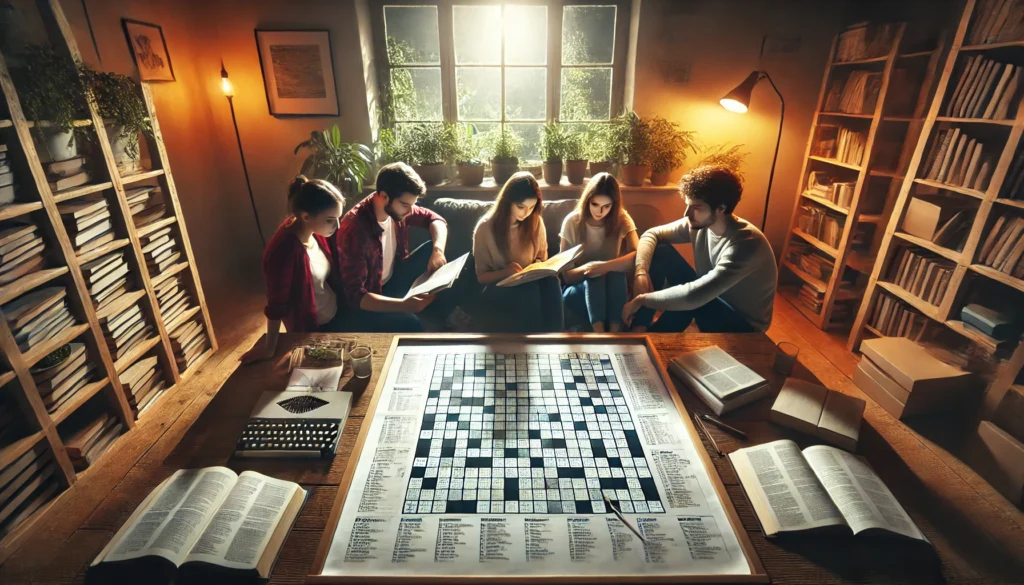Unlocking Cognitive Vitality Through Crosswords
In an era where mental agility and memory retention are more critical than ever, the humble crossword puzzle emerges as a powerhouse for cognitive health. As both an engaging pastime and a robust brain-training exercise, crosswords bridge the gap between entertainment and mental enhancement. They exemplify the quintessential activity that exercises your brain, offering a wealth of benefits that extend far beyond mere wordplay.
Crossword puzzles challenge the mind, requiring solvers to recall, analyze, and synthesize information in creative ways. This article delves into the profound impact of crosswords on short-term memory, explaining how these puzzles sharpen cognitive skills, bolster memory, and contribute to overall mental well-being. By embracing crosswords, individuals can unlock a pathway to sharper thinking, better memory, and enhanced mental resilience.
You may also like: How to Improve Working Memory: Top Short-Term Boosters and Practical Tips
Understanding the Cognitive Mechanisms Behind Crosswords
Crosswords are not mere word games; they are structured cognitive challenges that engage multiple regions of the brain simultaneously. The activity requires players to recall vocabulary, apply logic, and think laterally to solve clues. This combination activates neural pathways and promotes synaptic plasticity, the brain’s ability to form and reorganize connections in response to learning.
When solving a crossword puzzle, the brain works in overdrive to retrieve information from long-term memory while processing and analyzing clues in real-time. Activities like these strengthen working memory—the mental capacity to hold and manipulate information over short periods—and improve overall cognitive endurance. Research has shown that participating in activities that exercise your brain, crossword puzzles included, can delay the onset of age-related cognitive decline and enhance problem-solving skills.
Crosswords and Short-Term Memory Enhancement
The Science of Memory and Recall
Short-term memory serves as the brain’s temporary storage system. It holds limited amounts of information for brief periods, typically seconds to minutes. This type of memory is vital for daily tasks, from remembering phone numbers to following directions. However, like any muscle, memory requires regular exercise to stay sharp. Engaging in activities that challenge memory recall, such as solving crossword puzzles, reinforces neural connections and helps combat the natural decline of cognitive functions over time.
How Crosswords Boost Memory Retention
Crossword puzzles are an exceptional tool for short-term memory enhancement because they demand active engagement with language, facts, and logic. Each clue provides an opportunity to recall relevant information—whether it’s a word’s definition, a synonym, or a cultural reference. Solvers must often rely on context clues and associative thinking to fill in the blanks. This dynamic interaction strengthens working memory by requiring the solver to hold multiple pieces of information simultaneously and integrate them to arrive at the correct answer.
Moreover, crosswords encourage repetitive retrieval, a process critical for transferring information from short-term to long-term memory. Each time a solver revisits a partially completed puzzle or reconsiders a tricky clue, they reinforce the neural pathways associated with that information.
Why Crosswords Are the Best Activity That Exercises Your Brain
Unique Cognitive Demands
Unlike other mental exercises, crosswords engage the brain on multiple levels. They require language processing, pattern recognition, and logical reasoning—all within a structured yet flexible framework. This multifaceted engagement makes crosswords a comprehensive mental workout. Other activities may target singular cognitive functions, but crosswords uniquely stimulate both hemispheres of the brain, promoting a holistic approach to mental fitness.

Accessibility and Adaptability
Crosswords are universally accessible. Whether found in newspapers, books, or online platforms, they offer a convenient way to engage in brain-training exercises. Additionally, puzzles come in varying difficulty levels, allowing individuals to select challenges suited to their cognitive abilities and goals. For beginners, simpler puzzles build confidence and foundational skills, while advanced solvers can tackle complex grids to push their cognitive boundaries.
Exploring the Role of Clues in Crossword Solving
Decoding the “Activity That Exercises Your Brain Crossword Clue”
One of the most engaging aspects of crosswords is deciphering clues. The phrase “activity that exercises your brain crossword clue” itself underscores the intricate relationship between the puzzle and cognitive engagement. Clues range from straightforward definitions to cryptic hints that require abstract thinking. This diversity challenges solvers to approach problems from multiple perspectives, fostering mental flexibility and adaptability.
Clues often encourage solvers to draw upon diverse knowledge bases, from vocabulary and idiomatic expressions to historical facts and pop culture references. By engaging in this mental scavenger hunt, solvers activate neural pathways associated with learning and memory, enhancing their overall cognitive repertoire.
Types of Clues and Their Cognitive Impact
- Straightforward Clues: These require direct recall of vocabulary or factual information, promoting memory retention.
- Cryptic Clues: These involve wordplay, puns, or double meanings, challenging solvers to think abstractly and creatively.
- Cross-Referential Clues: These require solvers to connect multiple parts of the puzzle, strengthening working memory and attention to detail.
Integrating Crosswords into a Cognitive Health Routine
Daily Practice for Long-Term Benefits
Consistency is key when using crosswords to boost cognitive health. Allocating even 15 to 30 minutes daily to solving puzzles can yield significant benefits over time. This regular engagement maintains neural activity and enhances mental stamina. For those new to the practice, starting with easier puzzles can help build familiarity and confidence, paving the way for tackling more challenging grids.
Pairing Crosswords with Other Cognitive Activities
While crosswords are an outstanding standalone activity, combining them with other cognitive exercises can amplify their benefits. Activities such as reading, playing strategy games, or engaging in creative writing complement the skills developed through crossword solving. Together, these practices create a robust cognitive training regimen that supports overall mental agility.
The Broader Benefits of Crossword Solving
Stress Reduction and Emotional Well-Being
In addition to cognitive benefits, solving crosswords can promote emotional well-being. The focused nature of the activity provides a meditative quality, helping solvers tune out distractions and reduce stress. Successfully completing a challenging puzzle also triggers a sense of accomplishment, boosting self-esteem and motivation.
Social and Community Engagement
Crosswords can also foster social connections. Collaborative solving sessions with friends, family, or online communities offer opportunities for shared learning and camaraderie. Engaging in group activities that exercise your brain, crossword-solving included, can enhance both cognitive and social well-being.
The Future of Crosswords in Cognitive Enhancement
As digital platforms continue to evolve, crosswords are becoming increasingly sophisticated. Interactive apps and online puzzles now incorporate adaptive algorithms that tailor challenges to individual users’ skill levels. These innovations ensure that solvers remain engaged and challenged, maximizing the cognitive benefits of this timeless activity.

Empowering Your Brain: The Enduring Benefits of Crosswords
Crosswords are more than just a pastime; they are a gateway to enhanced cognitive health and mental clarity. By consistently engaging in this activity that exercises your brain, crossword enthusiasts can cultivate sharper thinking, improved memory, and a more resilient mind. Whether you’re a novice solver or a seasoned expert, the benefits of this brain-training exercise are profound and long-lasting.
Make crosswords a cornerstone of your mental wellness routine. As you solve each puzzle, you’re not only filling in blanks but also building a stronger, healthier brain. The journey to cognitive vitality starts today, one clue at a time.
Further Reading
SoM: Boost Your Brain: Working Memory Exercises for Adults
ND: 12 Fun Working Memory Games And Activities For Adults
LH: 25 Memory Exercises That Actually Help You Remember More
MND: 22 brain exercises to improve memory, cognition, and creativity
MMM: How to Improve Working Memory: 8 Exercises That Work
Important Note: The information contained in this article is for general informational purposes only, and should not be construed as health or medical advice, nor is it intended to diagnose, prevent, treat, or cure any disease or health condition. Before embarking on any diet, fitness regimen, or program of nutritional supplementation, it is advisable to consult your healthcare professional in order to determine its safety and probable efficacy in terms of your individual state of health.
Regarding Nutritional Supplements Or Other Non-Prescription Health Products: If any nutritional supplements or other non-prescription health products are mentioned in the foregoing article, any claims or statements made about them have not been evaluated by the U.S. Food and Drug Administration, and such nutritional supplements or other health products are not intended to diagnose, treat, cure, or prevent any disease.


